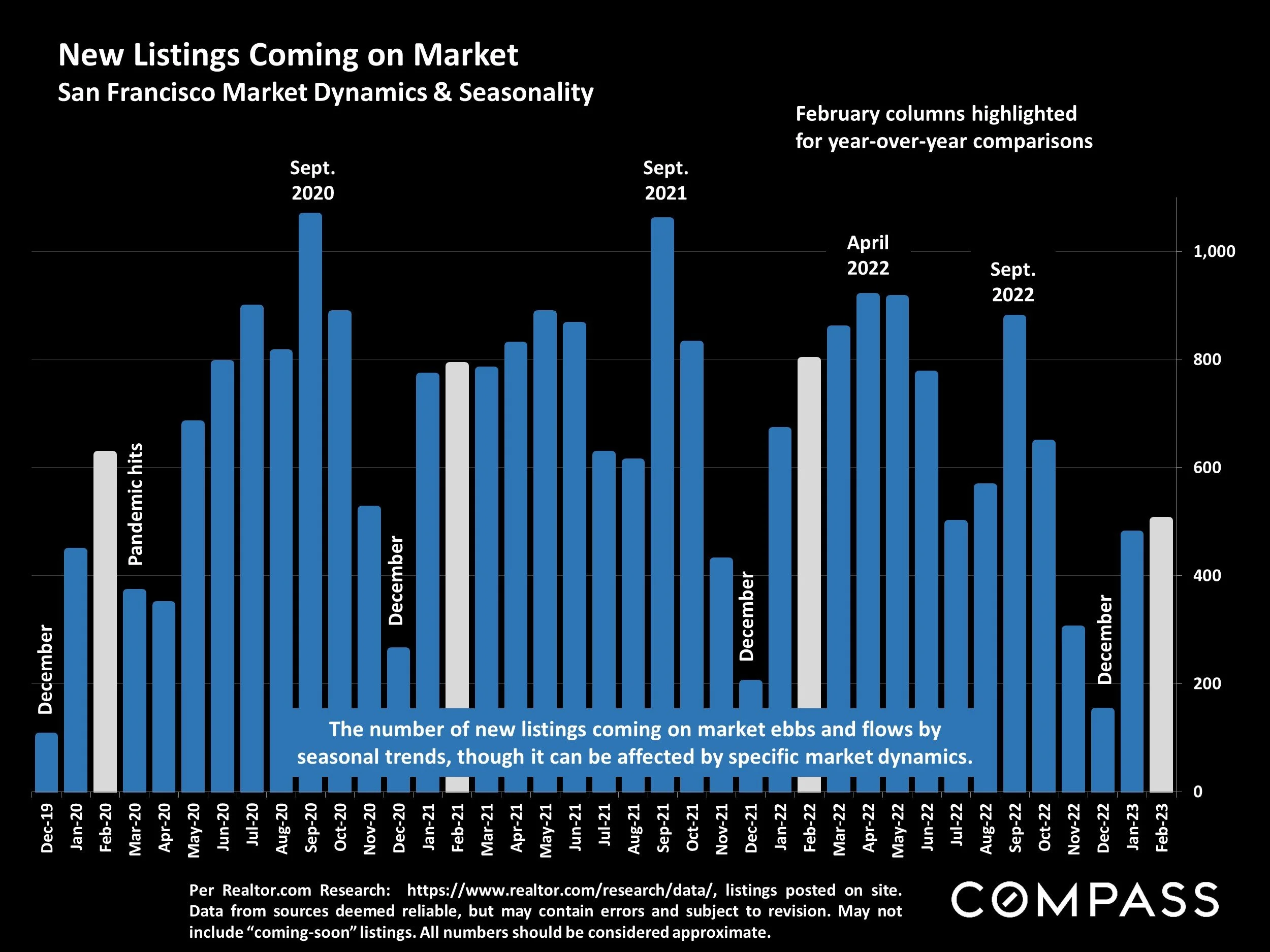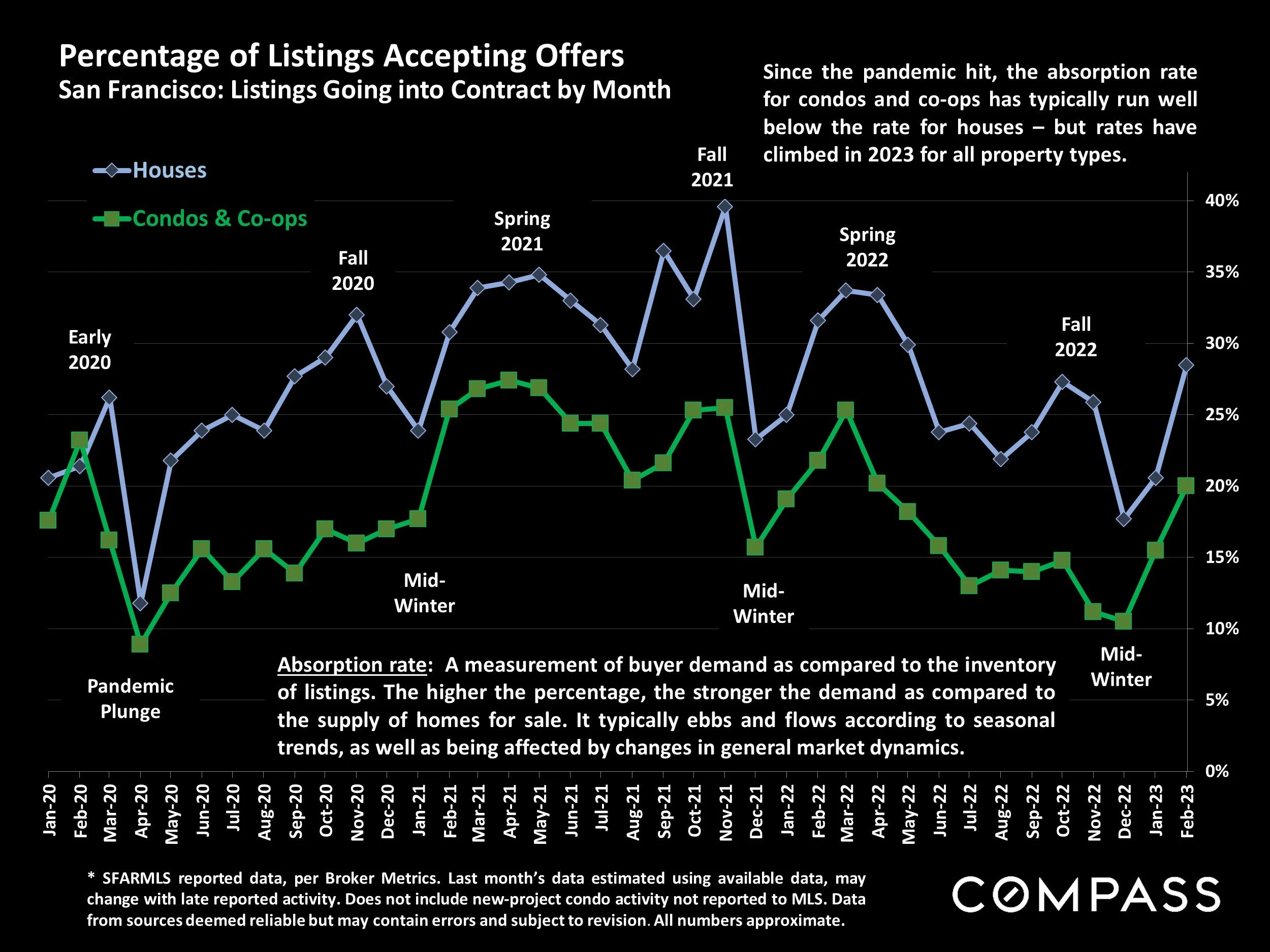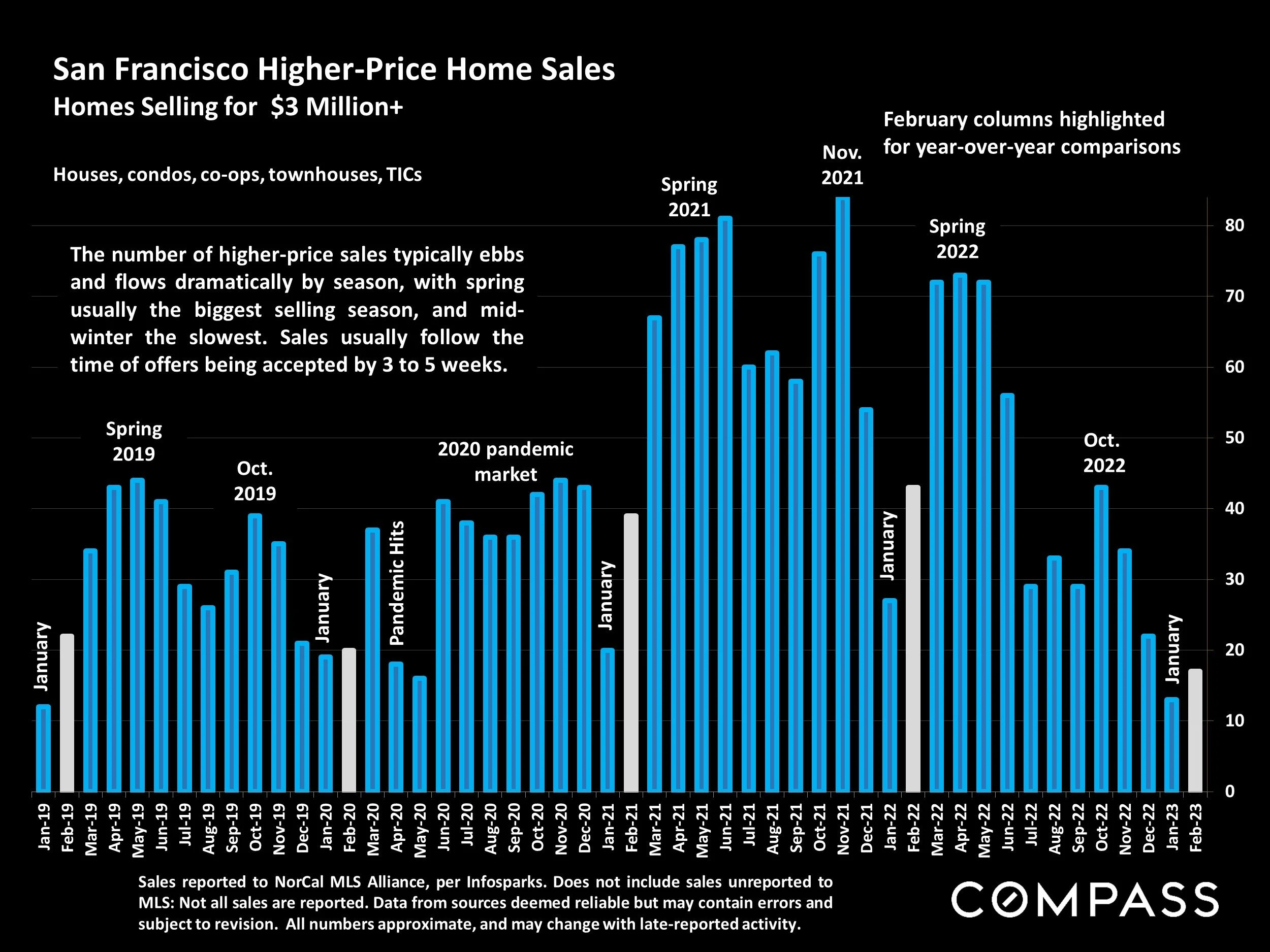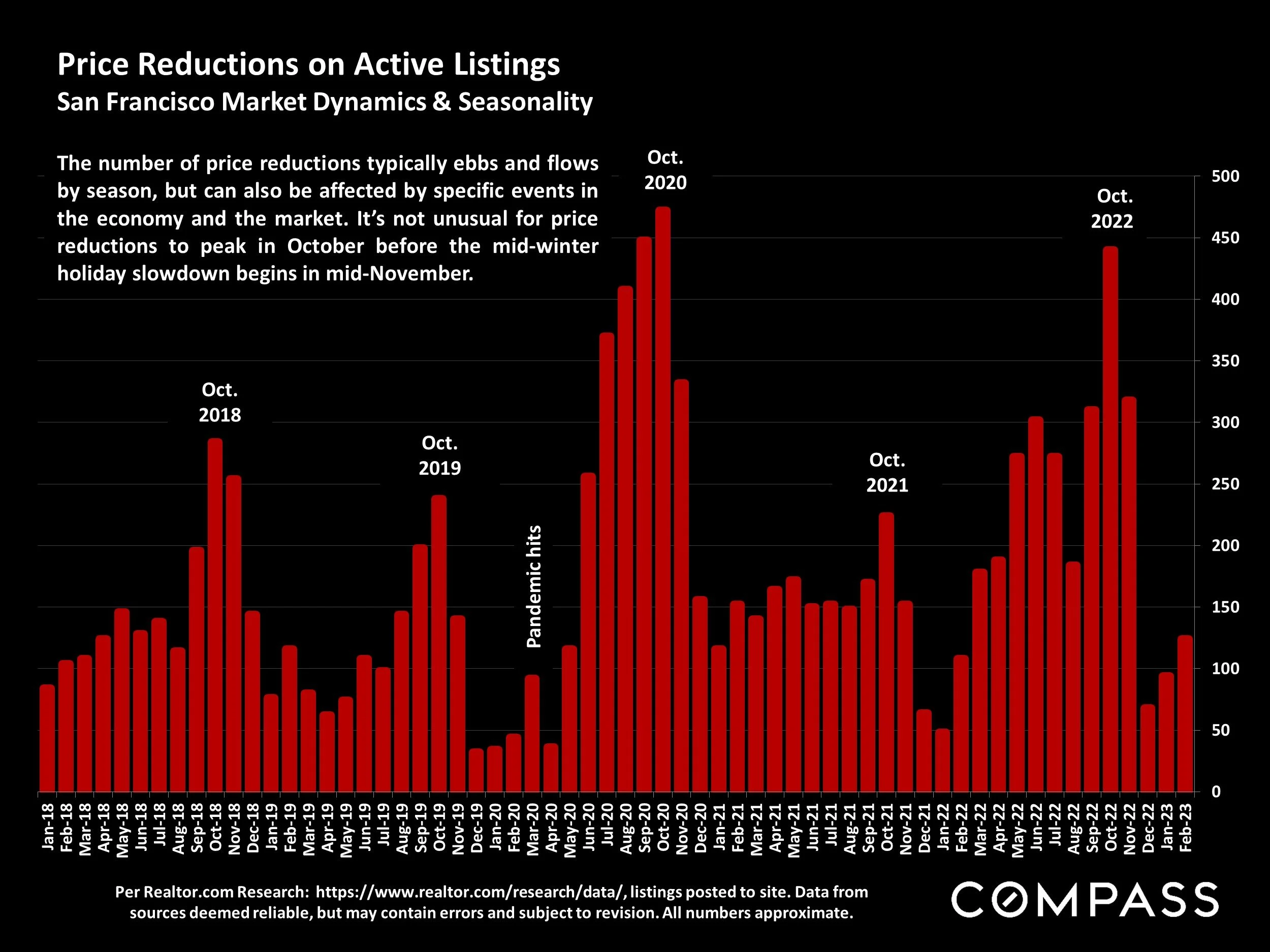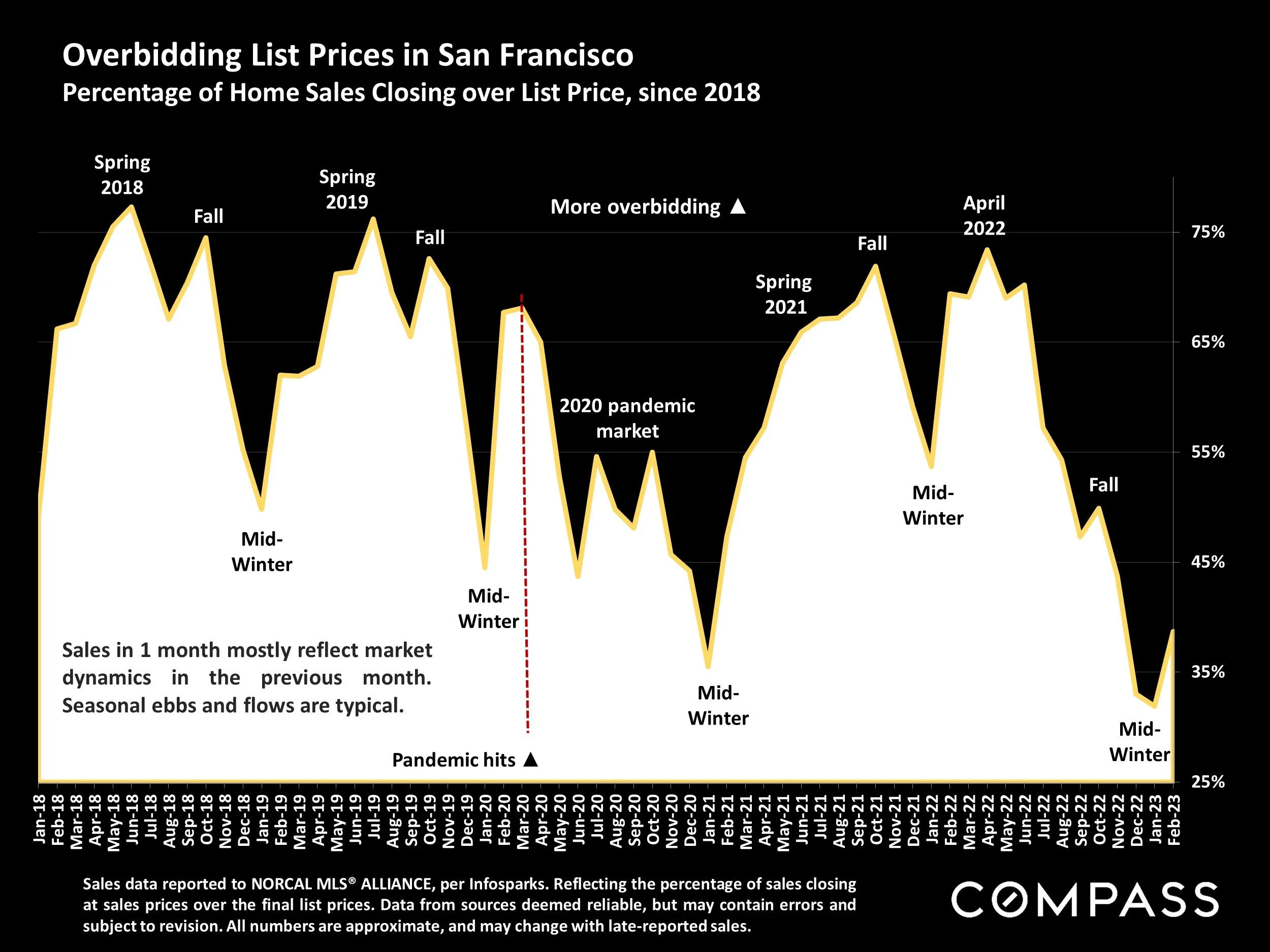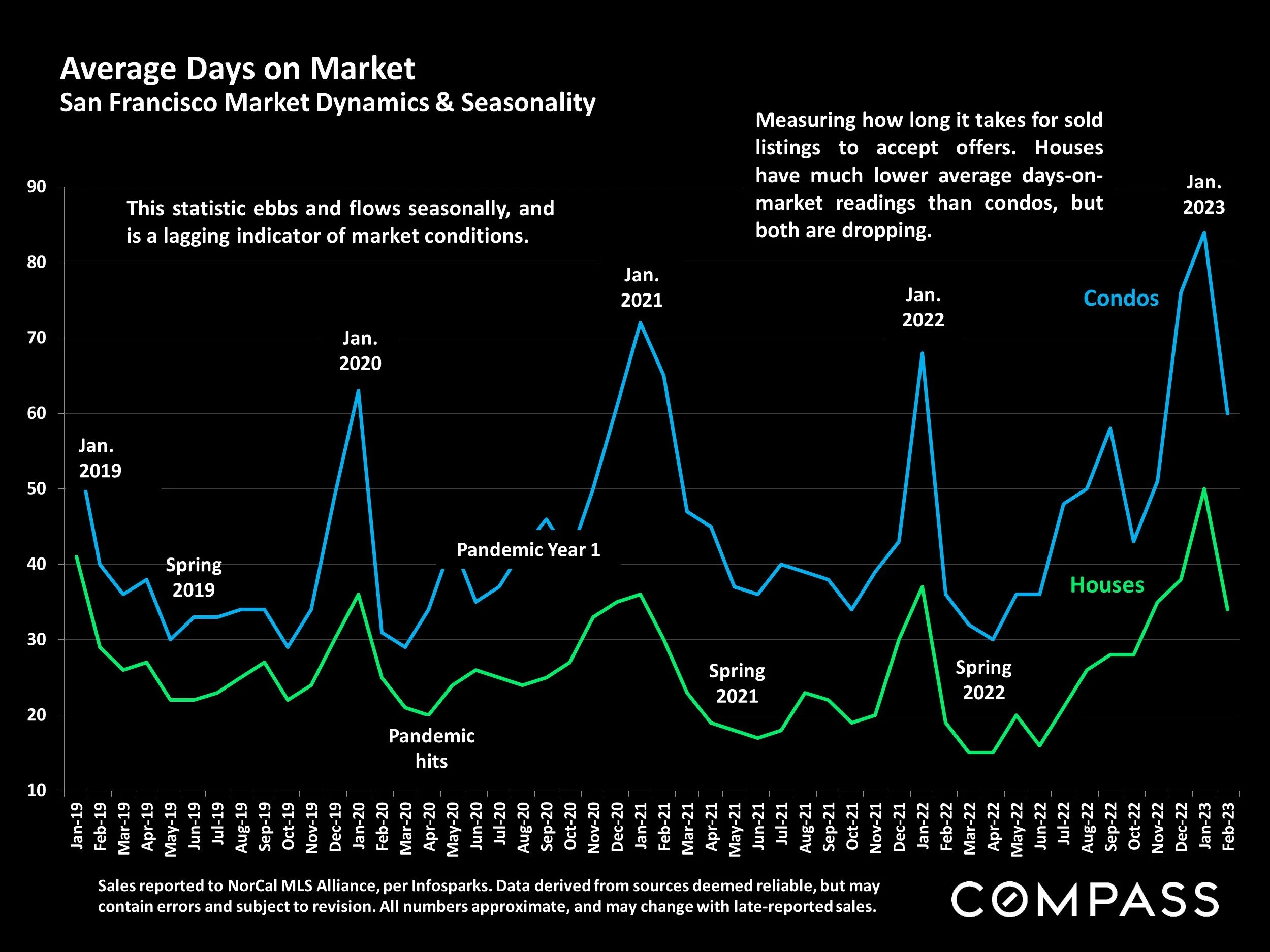March 2023 Market Report
2023 Market Indicators Turn Positive (But Interest Rates Climb Again)
After the acute decline in market activity occurring in the 2nd half of 2022, buyer demand rebounded dramatically and most market indicators turned positive in early 2023: Open house traffic, number of offers, and overbidding and absorption rates all saw improvement.*
It is too early for significant effects to show up in home prices: Indeed, through February, 3-month-rolling median house sales prices saw year-over-year declines across all Bay Area counties. (These percentage declines should be regarded cautiously until substantiated over the longer term.) Even with the striking improvement in demand over late 2022, most year-over-year indicators remain depressed, but these comparisons are with the severely overheated conditions prevailing at the peak of a 10-year housing market upcycle. The market was still just waking up in February. March through May is typically the most active listing and sales period of the year, and should soon provide much more data on supply, demand and price trends. Over the last 3 years, spring markets were deeply affected, in very different and often surprising ways, by the onset of the pandemic (2020), the pandemic boom (2021), and soaring interest rates (2022).
As has been the case for the last 14 months, the biggest wildcard remains interest rates: After dropping considerably in January from a November peak, they climbed again in February, with big impacts on loan application rates. It has been very challenging to predict short-term interest rate changes. Another major factor is the substantial decrease in the number of new listings coming on market, a critical issue with wide ramifications if it continues.
*Sales in one month generally reflect deal-making in the previous month, and often pertain to listings that have already been on the market for months longer. Many real estate statistics are lagging indicators, and even dramatic shifts in demand may show up only very gradually in their readings.
Mortgage Interest Rates, Long-Term Trends since 1976
30-Year Conforming Fixed-Rate Loans, Weekly Average Readings
Freddie Mac, 30-Year Fixed Rate Mortgage Average in the United States [MORTGAGE30US], retrieved from FRED, Federal Reserve Bank of St. Louis; https://fred.stlouisfed.org/series/MORTGAGE30US. Data from sources deemed reliable but not guaranteed. All numbers approximate.
After dropping in January from a November peak, interest rates climbed again in February. The Freddie Mac 30-Year Conforming Rate is currently 6.65% (as of March 6, 2023). While higher than our unprecendented lows during the pandemic, rates are comparatively normal when viewed in historical context.
San Francisco HOUSE Sales Statistics
Late 2022/Early 2023 Market, 4 Months Sales*
Low sales volumes often lead to significant fluctuations in median values between periods measured.
| San Francisco Neighborhoods | # of Sales | Median Sales Price | Median $/Sq. Ft. | Median Size (Sq. Ft.) | Avg. Days on Market | Sales within 30 Days | Highest Sale in Period |
|---|---|---|---|---|---|---|---|
| Pacific & Presidio Heights | 8 | $4,464,000 | $1741 | 4920 | 53 days | 12% | $13,500,000 |
| Sea Cliff, Lake St., Jordan Park | 16 | $3,964,000 | $1059 | 3620 | 31 days | 56% | $6,200,000 |
| Marina & Cow Hollow | 8 | $3,933,000 | $1427 | 2922 | 19 days | 75% | $11,200,000 |
| St. Francis Wood, Forest Hill | 12 | $3,600,000 | $1040 | 3600 | 36 days | 41% | $5,700,000 |
| Noe & Eureka Valleys | 46 | $2,322,500 | $1209 | 1952 | 30 days | 65% | $4,999,000 |
| Cole Valley, Ashbury Heights | 8 | $2,287,500 | $1202 | 2495 | 24 days | 62% | $4,400,000 |
| Inner & Central Richmond | 22 | $2,125,000 | $940 | 2372 | 31 days | 59% | $3,675,000 |
| Potrero Hill | 14 | $1,835,000 | $1039 | 2060 | 28 days | 71% | $4,260,000 |
| Inner Sunset, GG Heights | 17 | $1,750,000 | $1066 | 1621 | 18 days | 94% | $3,100,000 |
| Lakeside, Lake Shore | 10 | $1,727,500 | $941 | 1965 | 27 days | 60% | $2,100,000 |
| Glen Park | 17 | $1,610,000 | $1034 | 1625 | 38 days | 47% | $4,700,000 |
| Miraloma Park, Midtown Ter. | 23 | $1,550,000 | $985 | 1572 | 22 days | 65% | $2,860,000 |
| Central Sunset & Parkside | 53 | $1,500,000 | $918 | 1724 | 30 days | 64% | $2,772,000 |
| Bernal Heights | 34 | $1,497,500 | $958 | 1772 | 29 days | 58% | $2,500,000 |
| Outer Sunset & Parkside | 30 | $1,405,000 | $974 | 1432 | 30 days | 60% | $2,350,000 |
| Excelsior & Portola | 43 | $1,177,000 | $800 | 1404 | 30 days | 62% | $1,620,000 |
| Ingleside & Oceanview | 17 | $1,050,000 | $810 | 1426 | 45 days | 35% | $1,685,000 |
| Bayview & Silver Terrace | 20 | $1,025,000 | $656 | 1516 | 68 days | 30% | $1,350,000 |
* 4 months sales reported to NorCal MLS Alliance, through late February 2023. “Sales within 30 days” refers to % of home sales into contract within 30 days. Data derived from sources deemed reliable, but may contain errors and subject to revision. All numbers approximate. Outlier data adjusted when identified. Not all sales are reported to MLS.
San Francisco 2-BR/2-BA CONDO Sales
Late 2022/Early 2023, 4 Months Sales*
| Selected San Francisco Neighborhoods | Number of 2/2 Sales | Median Price | Median $/Sq. Ft. | Median Size | Avg. Days on Market | Sales within 30 Days | Highest 2/2 Condo Sale |
|---|---|---|---|---|---|---|---|
| Cow Hollow & Marina | 6 | $1,812,500 | $1415 | 1257 | N/A | 66% | $2,595,000 |
| Pacific & Presidio Heights | 9 | $1,600,000 | $1191 | 1395 | 26 days | 55% | $4,980,000 |
| South Beach | 21 | $1,430,000 | $1036 | 1330 | 57 days | 28% | $2,403,000 |
| Inner Richmond, Lake Street, Lone Mountain | 5 | $1,420,000 | $999 | 1425 | 22 days | 80% | $1,565,000 |
| Noe, Eureka & Cole Valleys (Realtor District 5) | 18 | $1,337,500 | $1177 | 1226 | 33 days | 55% | $2,050,000 |
| Yerba Buena | 6 | $1,282,500 | $993 | 1383 | 57 days | 16% | $1,732,500 |
| Mission Bay | 8 | $1,269,500 | $1088 | 1276 | 80 days | 37% | $3,100,000 |
| Hayes Valley, NoPa, Lower Pacific Heights | 18 | $1,245,000 | $1024 | 1107 | 22 days | 72% | $1,675,000 |
| Potrero Hill | 7 | $1,215,000 | $1200 | 1125 | 39 days | 71% | $1,535,000 |
| Russian, Nob & Tel Hills; North Beach, Financial Dist. | 14 | $1,100,000 | $1076 | 1060 | 53 days | 28% | $2,250,000 |
| Van Ness/Civic Center | 12 | $1,075,000 | $865 | 1173 | 60 days | 25% | $1,500,000 |
| Inner Mission, Dogpatch | 12 | $1,042,500 | $863 | 1128 | 65 days | 25% | $1,475,000 |
| South of Market (SoMa) | 8 | $997,500 | $905 | 1000 | 58 days | 12% | $2,300,000 |
| Hunter’s & Candlestick Points, Crocker Amazon | 5 | $699,000 | $668 | 1063 | N/A | 20% | $790,000 |
* 4 months sales of 2-bedroom/2-bath condos reported to NorCal MLS Alliance, through late February 2023. Data derived from sources deemed reliable, but may contain errors and subject to revision. All numbers approximate. Many new-project condo sales are not reported to MLS, and not included in this analysis. Outlier data adjusted when identified. The floor a condo is on can have a large impact on values.
San Francisco House Price Trends since 1990
Monthly Median House Sales Prices, 3-Month Rolling
3-month rolling average of monthly median sales prices for “existing” houses, per CA Association of Realtors or 3-month rolling median per NorCal MLS Alliance. 2-period moving trend line. Analysis may contain errors and subject to revision. All numbers approximate, and may change with late-reported sales.
Median sales price is that price at which half the sales occurred for more and half for less. It is a very general statistic, disguising an enormous range of sales prices in the underlying sales. It is often affected by other factors besides changes in fair market value. Monthly and seasonal fluctuations are common, which explain many of the regular ups and downs in this chart. Longer-term trends are much more meaningful than short-term changes.
Year over year, the 3-month rolling, SF median house sales price in February 2023, $1,500,000, was down about 14.5%.
San Francisco Year-over-Year HOUSE Appreciation Rates since 2020
Percentage Change in Year-over-Year, 3-Month-Rolling Median House Sales Price*
*3-month rolling sales reported to NorCal MLS Alliance, per Infosparks. Data from sources deemed reliable, but may contain errors and subject to revision. Percentages rounded to near full percentage point. All numbers approximate.
Comparing the 3-month-rolling median house sales price with the same period of the previous year to calculate the percentage change. Median sales prices can be affected by a variety of factors other than changes in fair market value, as can year-over-year appreciation rates.
Using 3-month-rolling data smooths out median sales prices and year-over-year appreciation rates, but may lag shorter-term changes in the market.
San Francisco Condo Price Trends since 2005
3-Month Rolling, Median 2-BR Condo Sales Prices
3-month rolling median 2-bedroom condo sales prices reported to NorCal MLS Alliance, per Infosparks. 2-period moving trend line. Analysis may contain errors and subject to revision. All numbers approximate, and may change with late-reported sales.
Median sales price is that price at which half the sales occurred for more and half for less. It is a very general statistic, often affected by other factors besides changes in fair market value. Monthly and seasonal fluctuations are common, and longer-term trends are more meaningful than short-term changes.
Year over year, the 3-month rolling, SF median 2-bedroom condo sales price in February 2023, $1,202,500, was down about 11%.
San Francisco Year-over-Year 2-BR CONDO Appreciation Rates since 2020
% Change in Year-over-Year, 3-Month-Rolling Median 2-Bedroom CONDO Sales Price*
*3-month rolling sales reported to NorCal MLS Alliance, per Infosparks. Data from sources deemed reliable, but may contain errors and subject to revision. Percentages rounded. All numbers approximate.
Comparing the 3-month rolling median 2-bedroom condo sales price with the same period of the previous year to calculate the percentage change. Median sales prices can be affected by a variety of factors other than changes in fair market value.
Condo median sales prices generally dropped in the aftermath of the pandemic hitting.
Using 3-month-rolling data smooths out median sales prices and year-over-year appreciation rates, but may lag shorter-term changes in the market.
New Listings Coming on Market
San Francisco Market Dynamics & Seasonality
Per Realtor.com Research: https://www.realtor.com/research/data/, listings posted on site. Data from sources deemed reliable, but may contain errors and subject to revision. May not include “coming-soon” listings. All numbers should be considered approximate.
February columns highlighted for year-over-year comparisons. Normally, the spring selling season kicks into gear by February, as is illustrated by the highlighted columns in years past. In 2023, inventory is slow to open up, at least just yet.
New Listings Coming on Market: Broad, Long-Term Trends
San Francisco, 12-Month Rolling, MLS Listing Data, since 2007*
* Each data point reflects the TOTAL of 12 months of activity for “all attached/detached” homes. 1/12 of these numbers = an average month within the 12 month period. New listings reported to NorCal MLS Alliance, per Infosparks. Not all new listings are posted to MLS. Data from sources deemed reliable, but may contain errors and subject to revision. Numbers are approximate and are meant to illustrate broad trends.
Various markets since 2007 have seen ebbs and flows in the number of new listings coming on market. The pandemic saw a huge surge, particularly of condos – which number remains highly elevated – but new-listing volumes have been dropping rapidly since spring 2022.
Each data point reflects 12 months of new listing activity in MLS: Average monthly volumes = 1/12 of these compiled figures. 12-month rolling data delivers broad, long-term trend lines, generally deleting the effect of market seasonality, but may disguise and lag shorter term changes.
San Francisco Homes Market
Active & Coming-Soon Listings on 1st of Month*
* Houses, condos, co-ops, TICs, townhouses: Active/Coming-Soon listings posted to NorCal MLS Alliance. Does not include new-project condos not listed on MLS. Data from sources deemed reliable, but may contain errors and subject to revision. All numbers approximate. The # of active listings changes constantly.
The # of active listings on a given day is affected by 1) the # of new listings coming on market, 2) how quickly buyers put them into contract, 3) the sustained heat of the market over time, and 4) sellers pulling their homes off the market without selling.
San Francisco: Supply of Inventory
Active/Coming-Soon Listings*
Active & Coming-Soon House, Condo, Co-op, TIC & Townhouse Listings Posted to MLS
on March 1, 2023, by Price Segment*
Under $1,000,000: 345 listings
$1,000,000 - $1,999,999: 389 listings
$2,000,000 - $2,999,999: 124 listings
$3,000,000 - $4,999,999: 82 listings
$5,000,000 - $9,999,999: 54 listings
$10,000,000 & above: 24 listings
Includes 5 listings priced at $20,000,000+
87% of listings under $1,000,000 were condos, co-ops, townhouses or TICs
Active/Coming Soon Listings with Median List (Asking) Prices*
Houses – 298 listings - $1,915,000
Condos – 613 listings - $1,198,000
TICs – 91 listings - $1,150,000
Co-ops – 19 listings - $2,750,000
Townhouses – 11 listings - $1,299,000
Residential Income Properties:
2-Unit Buildings – 76 listings - $1,999,500
3-Unit Buildings – 33 listings - $2,125,000
4-Unit Buildings – 17 listings - $2,300,000
Median list prices may not be representative of typical median sales values. Home sizes and values vary widely within and between neighborhoods.
Numbers do not include new-project condo listings not posted to MLS. Data above as of 2/28/23.
* Active/Coming Soon listings (no offer accepted) posted to NorCal MLS Alliance. Data from sources deemed reliable, but may contain errors and subject to revision. Not all listings are posted to MLS. All numbers approximate. Numbers of listings and median list prices change constantly.
Listings Accepting Offers- Longer-Term Trends
San Francisco Market Dynamics & Seasonality
Per activity reported to NorCal MLS Alliance, per Infosparks. Data from sources deemed reliable but may contain errors and subject to revision. All numbers approximate. Last month numbers estimated based on available data, and may change with late reported activity.
The number of listings going into contract is typically considered the most up-to-date measurement of market activity, but the last month’s number should be considered preliminary due to the issue of late-reported data.
Percentage of Listings Accepting Offers
San Francisco: Listings Going into Contract by Month
* SFARMLS reported data, per Broker Metrics. Last month’s data estimated using available data, may change with late reported activity. Does not include new-project condo activity not reported to MLS. Data from sources deemed reliable but may contain errors and subject to revision. All numbers approximate.
Since the pandemic hit, the absorption rate for condos and co-ops has typically run well below the rate for houses – but rates have climbed in 2023 for all property types.
Absorption rate is a measurement of buyer demand as compared to the inventory of listings. The higher the percentage, the stronger the demand as compared to the supply of homes for sale; in other words, more favorable to sellers. Conversely, the lower the absorption rate, the more favorable to buyers, generally. It typically ebbs and flows according to seasonal trends, as well as being affected by changes in general market dynamics.
Monthly Sales Volume
San Francisco Market Dynamics & Seasonality
Sales of houses, condos, townhouses reported to NorCal MLS Alliance, per Infosparks. Data from sources deemed reliable but may contain errors and subject to revision. Last month estimated based on available information and may change with late reported sales. All numbers approximate.
Sales in one month mostly reflect accepted-offer activity in the previous month. February columns highlighted for year-over-year comparisons.
San Francisco Higher-Price Home Sales
Homes Selling for $3 Million+: Houses, condos, co-ops, townhouses, TICs
Sales reported to NorCal MLS Alliance, per Infosparks. Does not include sales unreported to MLS: Not all sales are reported. Data from sources deemed reliable but may contain errors and subject to revision. All numbers approximate, and may change with late-reported activity.
The number of higher-price sales typically ebbs and flows dramatically by season, with spring usually the biggest selling season, and mid-winter the slowest. Sales usually follow the time of offers being accepted by 3 to 5 weeks.
San Francisco Long-Term Luxury Home Sales Trends
6-Month Rolling Sales Volumes since 2015*
* 6-month rolling sales data as reported to NorCal MLS Alliance, per Infosparks. “Condo & Co-op” sales include TIC and townhouse sales. Numbers may change with late reported sales. Data from sources deemed reliable, but may contain errors and subject to revision. Not all sales are reported to MLS, including some new-project luxury condo sales. All numbers approximate.
Luxury home sales really peaked during the pandemic, but have returned to more typical, pre-pandemic patters of late.
Each data point reflects 6 months of MLS sales: Average monthly sales volumes = 1/6 of these compiled figures. 6-month rolling data delivers broad, clear, long-term trend lines – which will still reflect some seasonal ebbs and flows in sales – but may disguise and lag shorter term changes.
Price Reductions on Active Listings
San Francisco Market Dynamics & Seasonality
Per Realtor.com Research: https://www.realtor.com/research/data/, listings posted to site. Data from sources deemed reliable, but may contain errors and subject to revision. All numbers approximate.
It’s worth noting the significant uptick in price reductions in 2020 (during the onset of the pandemic and lockdown), and again starting in mid-2022 (when interest rates aggressively rose). That there have been fewer price reductions in the last few months could be an indicator that sellers are getting more realistic about pricing.
The number of price reductions typically ebbs and flows by season, but can also be affected by specific events in the economy and the market. It’s not unusual for price reductions to peak in October before the mid-winter holiday slowdown begins in mid-November.
Overbidding List Prices in San Francisco
Percentage of Home Sales Closing over List Price, since 2018
Sales data reported to NORCAL MLS® ALLIANCE, per Infosparks. Reflecting the percentage of sales closing at sales prices over the final list prices. Data from sources deemed reliable, but may contain errors and subject to revision. All numbers are approximate, and may change with late-reported sales.
Sales in 1 month mostly reflect market dynamics in the previous month. Seasonal ebbs and flows are typical.
Average Sales Price to Original List Price Percentage
San Francisco Over/Under Bidding: Market Dynamics & Seasonality
Sales reported to NorCal MLS Alliance, per Infosparks. Data derived from sources deemed reliable, but may contain errors and subject to revision. All numbers approximate, and may change with late-reported sales.
Houses have higher average, sales price to list price percentages than condos. Both are much lower than last spring, but ticked up in February. This statistic fluctuates by season, and is a lagging indicator of market activity 3-6 weeks earlier.
Average Days on Market
San Francisco Market Dynamics & Seasonality
Sales reported to NorCal MLS Alliance, per Infosparks. Data derived from sources deemed reliable, but may contain errors and subject to revision. All numbers approximate, and may change with late-reported sales.
Measuring how long it takes for sold listings to accept offers. Houses have much lower average days-on-market readings than condos, but both are dropping. This statistic ebbs and flows seasonally, and is a lagging indicator of market conditions.
Statistics are generalities, essentially summaries of widely disparate data generated by dozens, hundreds or thousands of unique, individual sales occurring within different time periods. They are best seen not as precise measurements, but as broad, comparative indicators, with reasonable margins of error. Anomalous fluctuations in statistics are not uncommon, especially in smaller, expensive market segments. Last period data should be considered estimates that may change with late-reported data. Different analytics programs sometimes define statistics – such as “active listings,” “days on market,” and “months supply of inventory” – differently: what is most meaningful are not specific calculations but the trends they illustrate. Most listing and sales data derives from the local or regional multi-listing service (MLS) of the area specified in the analysis, but not all listings or sales are reported to MLS and these won’t be reflected in the data. “Homes” signifies real-property, single-household housing units: houses, condos, co-ops, townhouses, duets and TICs (but not mobile homes), as applicable to each market. City/town names refer specifically to the named cities and towns, unless otherwise delineated. Multi-county metro areas will be specified as such. Data from sources deemed reliable, but may contain errors and subject to revision. All numbers to be considered approximate.
Many aspects of value cannot be adequately reflected in median and average statistics: curb appeal, age, condition, amenities, views, lot size, quality of outdoor space, “bonus” rooms, additional parking, quality of location within the neighborhood, and so on. How any of these statistics apply to any particular home is unknown without a specific comparative market analysis.
Median Sales Price is that price at which half the properties sold for more and half for less. It may be affected by seasonality, “unusual” events, or changes in inventory and buying trends, as well as by changes in fair market value. The median sales price for an area will often conceal an enormous variety of sales prices in the underlying individual sales.
Dollar per Square Foot is based upon the home’s interior living space and does not include garages, unfinished attics and basements, rooms built without permit, patios, decks or yards (though all those can add value to a home). These figures are usually derived from appraisals or tax records, but are sometimes unreliable (especially for older homes) or unreported altogether. The calculation can only be made on those home sales that reported square footage.
Compass is a real estate broker licensed by the State of California, DRE 01527235. Equal Housing Opportunity. This report has been prepared solely for information purposes. The information herein is based on or derived from information generally available to the public and/or from sources believed to be reliable. No representation or warranty can be given with respect to the accuracy or completeness of the information. Compass disclaims any and all liability relating to this report, including without limitation any express or implied representations or warranties for statements contained in, and omissions from, the report. Nothing contained herein is intended to be or should be read as any regulatory, legal, tax, accounting or other advice and Compass does not provide such advice. All opinions are subject to change without notice. Compass makes no representation regarding the accuracy of any statements regarding any references to the laws, statutes or regulations of any state are those of the author(s). Past performance is no guarantee of future results.







